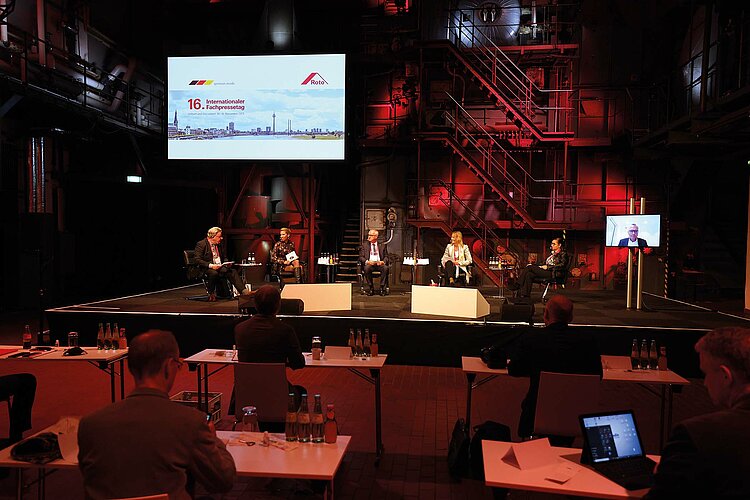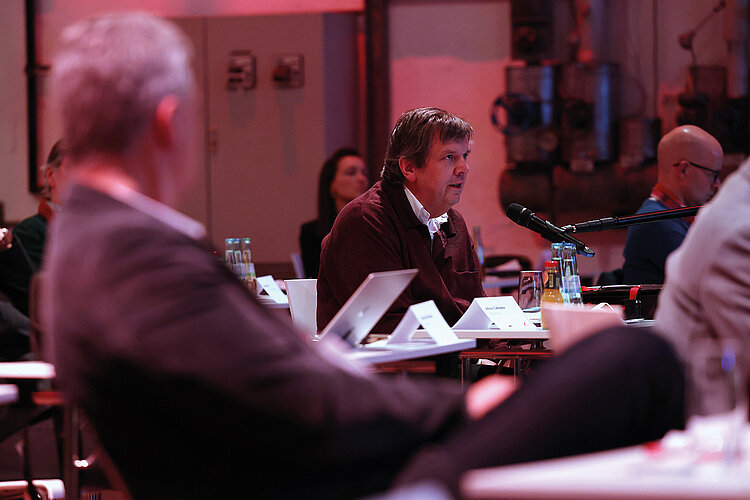
No alternative to digitalisation
Medium-sized companies and digitalisation: a need to catch up and no end in sight? / Lively panel discussion at the Roto Trade Press Day / Not a “nice thing to have” but a “must-have” / Pandemic as an accelerator / Change in culture and mentality often required / Involving people / Digitalisation chain must not break / Cybersecurity: increasingly significant by the day / Small companies also or particularly affected / Politics part of the problem or part of the solution?
Leinfelden / Echterdingen – For medium-sized companies, irrespective of their size, digitalisation is not a “nice thing to have” but rather a “must-have”. Digitalisation is decisive in determining a company’s competitiveness and future viability and, ultimately, whether it will survive on the market or not. This was the clear verdict arrived at by a panel discussion held as part of the 16th International Roto Trade Press Day in mid-November. As the event organiser could attest, the panel in Düsseldorf made up of participants from different sectors agreed on another key criterion – that digitalisation should concern everyone and everything. Digitalisation involves systematic networking with customers and suppliers, for example.
Leggi tutto
During the course of the 90-minute discussion, participants were invited to answer the core question of "medium-sized companies and digitalisation – a need to catch up and no end in sight?", as well as a series of related specific questions. Anja Müller, correspondent for family businesses at the “Handelsblatt” business newspaper, provided some out-of-the-box thinking for the construction and real estate industries. These sectors were represented by Sylvia Pruß (owner of Pruß Hausverwaltung e.K., Strausberg and Berlin, and vice president of Verband der Immobilienverwalter (VDIV) Deutschland e.V. [Association of Real Estate Managers Germany]), Marlen Schlosser (Managing Director of Schlosser Holzbau GmbH based in Jagstzell in the south-western German state of Baden-Württemberg), Christian Klinger (co-owner and company spokesman for Internorm International GmbH, speaking from Traun, Austria) and Dr Eckhard Keill, (Chairman of the Board of Directors of Roto Frank Holding AG). The lively discussion about digitalisation was chaired by agency owner Frank Linnig.
Integrating rather than imposing digitalisation
Sylvia Pruß did not believe that the real estate industry had any catching up to do, adding that the COVID-19 pandemic had certainly acted as an accelerator. She continued that this applied both to individual companies and the Verband der Immobilienverwalter (VDIV) Deutschland e.V. (Association of Real Estate Managers Germany). Pruß finished by stating that the sector was taking an proactive approach to the major challenge of digitalisation. The panel equally agreed that there was no alternative just as much as they believed that it would involve a lengthy and continuous process.
Anja Müller asserted that the start of this process often involved a change in a company’s culture and mentality. She added that digitalisation could not be imposed and could only be successful by integrating people and supporting them on the difficult road to change. Eckhard Keill agreed, stating his belief that “the digitalisation chain must not break at any point”. He continued that Roto had been quick in meeting its obligation to integrate both colleagues and customers. However, Marlen Schlosser also pointed to employees’ responsibility to be open to the modern world of work.
Meanwhile, from his experience, Christian Klinger had come to a positive interim conclusion, saying that anxiety concerning and a refusal to use such technology was no longer a problem after the pandemic. When asked by the moderator whether a willingness to pursue digitalisation was a generational issue, the panel had mixed opinions. They said that while there tended to be slightly greater openness among younger people, older workers also took a constructive approach towards new requirements.
Importance of raising awareness
The issue of cybersecurity was discussed in detail. The damage caused by such criminal attacks is growing rapidly and, according to a study by Digitalverband Bitkom (Bitkom German digital association), this amounted to over €220 billion in Germany alone in 2020. Are medium-sized companies massively underestimating the dangers of hacker attackers, data theft and other forms of cybercrime? In any case, Anja Müller described it as a “fallacy” to think that such crime only affected big businesses. She added that small companies in particular needed to ask themselves what not having access to computers for a week would cost them, for example. Müller stressed that raising awareness of cybercrime, which is becoming increasingly significant by the day, as an issue was vital. The “Handelsblatt” correspondent also criticised the fact that Germany did not have a central institution that could be contacted in the event of an attack and which would provide rapid assistance.
Eckhard Keill called for there to be such a prevention body across the whole of Germany. The head of Roto went on to acknowledge that the construction supplier’s international network had already been the target of criminal activities. He added that since this threat was not taken seriously enough initially, the Group was now investing large amounts of money into digital security. Sylvia Pruß and Christian Klinger also recounted having had negative experiences in this area, with the latter stating that “we need to talk openly about these things”.
Common position
Ultimately, what should digitalisation policy do or allow? Sylvia Pruß and Eckhard Keill argued in favour of adapting legislation to the current situation. They suggested that examples of this included holding meetings of owners digitally (which is now possible) and implementing effective cyber defence measures. In contrast, the Chairman of the Board of Directors at Roto was generally sceptical, asserting that politics could not really deal with digitalisation. He added that there was still a lack of digital skills development that was urgently needed at schools. Meanwhile, Marlen Schlosser wanted there to be better conditions in general, saying this started with Internet coverage in rural areas, which often remained poor.
In conclusion, all of the participants of the discussion re-emphasised the importance of systematic digitalisation. Their clear, common conclusion was that companies that made the most of the chances and opportunities related to digitalisation would (still) be successful in the future. On the other hand, companies that did not do this would disappear from the market sooner or later. The young Managing Director of Schlosser Holzbau passionately got to the heart of the matter when she explained to the around 75 trade journalists from 15 countries attending in person or digitally that “this area is so fascinating that you simply have to engage with it”.


